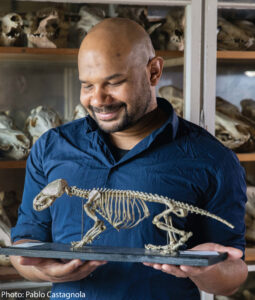2024 Public Lecture
“Natural History, the Curious Institution: An Evening with Evolutionary Biologist and Poet, Brandon Kilbourne”
Tuesday, October 29, 2024, 7:00 pm – 8:00 pm Central Time
Location: University of Minnesota, Bell Museum, Horizon Hall, 2088 Larpenteur Ave W, St. Paul, Minnesota 55113
Join us for an evening listening to and discussing poetry by Brandon Kilbourne, a prominent Black scientist and Science Officer at the Museum für Naturkunde in Berlin, Germany. Brandon uses his experiences as a scientist and world traveler to examine topics such as extinction, racism, and colonialism through poetry. His poems delve into the colonial legacy of collections that form the core of biodiversity data, how they intersect with his research, his lived experiences, and inform his outlook on life. Through the medium of poetry, the audience will understand the complicated legacy of natural history collections and research and the challenges for people of color to establish themselves in these predominantly white spaces.
Seating for this event is limited and requires separate registration. Click here for additional information and to register to attend. To receive free registration, please enter the promo code SVPAttendee when prompted.

Brandon Kilbourne is an evolutionary biologist and Science Officer at the Museum für Naturkunde in Berlin, Germany. He received a BA in bioengineering from Louisiana State University and his PhD in evolutionary biology from the University of Chicago. He researches how the limbs of mammals evolve and adapt to different environments and functions and has also published research on birds and dinosaurs. Brandon is also involved in an intercultural program to build bridges between African and European museums and he is featured in the exhibit “Black in Natural History Museums”. In addition to being a world-class researcher, Kilbourne is an accomplished poet whose works have been published in venues such as Ecotone, Poet Lore, Obsidian, Decolonial passage, and Split Rock Review. His poetry examines the intersection of natural history, colonialism, race, and extinction, and has been nominated twice for a Pushcart Prize.
